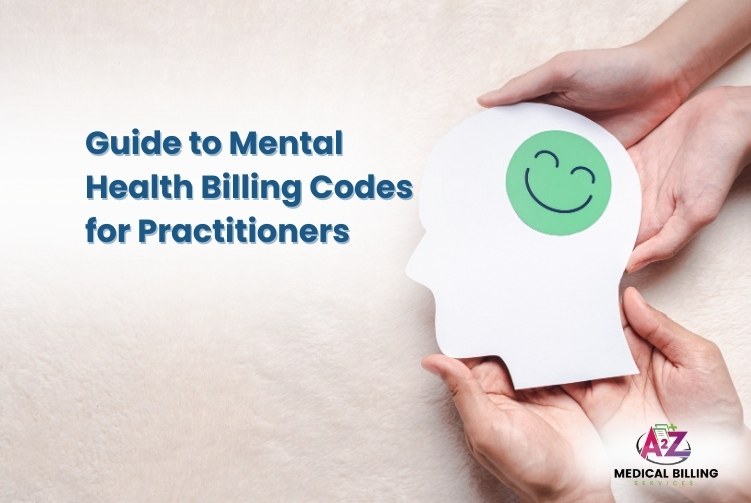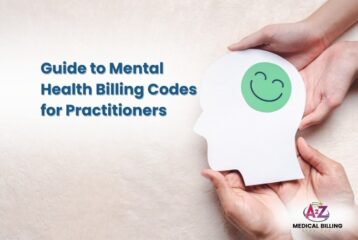The complex billing codes that are applied to mental health services are constantly changed and updated. utilizing clear justifications and useful illustrations. It serves as a training tool to help healthcare workers, coders, and medical billers effectively deal with the challenges of mental health billing.
This helps in placing a strong emphasis on application and practical knowledge by concentrating on what practitioners must know.
Understanding Mental Health Billing Codes
To ensure that providers are paid fairly, billing codes are essential for mental health treatments. Psychotherapy, crisis intervention, and psychiatric evaluation codes are examples of common codes.
Common Mental Health CPT Codes
| Code | Description | Typical Use Case |
| 90791 | Psychiatric diagnostic evaluation | Used for initial diagnostic interviews without medical services |
| 90834 | Psychotherapy, 45 minutes | Typically used for regular therapy sessions |
| 90837 | Psychotherapy, 60 minutes | Used for longer therapy sessions |
| 90853 | Group psychotherapy | Applied when therapy is provided in a group setting |
| 99404 | Preventive behavioral health, individual, 15-30 min | Used for preventive mental health services |
Utilizing Mental Health Billing Codes in Day-to-Day Billing
Mental health billing codes are more than just random numbers; they are essential to the continued financial viability of medical practices. The specifics of every session, such as its length and the kind of therapy offered, need to be precisely documented and matched with the appropriate billing number.
Detailed Guide to Common Billing Codes for Mental Health
Explanation of commonly used codes and their uses
Particular billing codes are essential in the field of mental health to accurately record treatments and guarantee payment. To ensure that practitioners and billing professionals can apply mental health billing codes effectively in a variety of settings. If you want to Know about telehealth mental health codes you can get here.
Applications of Common Mental Health Billing Codes
| Code | Description | Application Scenario |
| 90791 | Psychiatric diagnostic evaluation | Initial evaluation without medical services |
| 90832 | Psychotherapy, 30 minutes | Short sessions for follow-up or mild cases |
| 90834 | Psychotherapy, 45 minutes | Standard therapy sessions |
| 90837 | Psychotherapy, 60 minutes | Extended sessions for complex issues |
| 90847 | Family psychotherapy (with patient) | Family involvement in patient’s therapy |
| 90853 | Group psychotherapy | Therapy provided in a group setting |
| 99404 | Preventive behavioral health, individual, 30-60 min | Preventive services for at-risk patients |
Making Good Use of Billing Codes
It takes more than simply knowing the codes to use mental health billing effectively. Must also need to know when and how to apply them. The healthcare provider is kept efficient and compliant by regular evaluations of billing procedures and training for billing staff on the complex nature of these codes.
Utilizing Billing Codes Effectively
To accurately charge for mental health services, it is important to know the codes as well as when and how to apply them. Healthcare providers can maintain efficiency and compliance by regularly reviewing their billing processes and regularly training billing staff on the specifics of these codes.
Special Considerations in Mental Health Billing
Mental health care includes a wide range of locations and treatments, each with its own needs and billing codes. Understanding the complex characteristics of these services is crucial for accurate billing and compliance with legal requirements.
Discuss the difficulties associated with paying for various mental health services, including therapy sessions, inpatient care, and emergency interventions.
1. Therapy Sessions
Outpatient Therapy: Codes like 90834 (45-minute session) or 90837 (60-minute session) are usually used for regular therapy sessions. The amount of time spent matters since it directly influences the billing code that is applied.
Intensive Outpatient Programs (IOP): These require a different set of codes, often session-based, reflecting the intensive nature of the treatment.
2. Inpatient Care
Inpatient Services: These are billed differently as they cover 24-hour care. Codes like 99231 (subsequent hospital care) might be used daily to bill for the routine care provided in a psychiatric unit.
3. Emergency Interventions
Crisis Psychotherapy: This typically requires immediate attention and is billed under codes like 90839 (psychotherapy for crisis; first 60 minutes).
Practical Applications in Billing
Accurate billing for mental health treatments promotes the financial security of healthcare providers while also guaranteeing compliance. As an illustration:
Scenario: A critically ill patient Code 90839 may be used when a patient appears with an urgent mental health crisis. Code 90840 needs to be added if the session lasts longer than the first sixty minutes. Code 90840 covers each extra thirty minutes.
Billing for Mental Health Assessments
Step-by-Step Process for Coding and Billing Initial Assessments
Since it sets the criteria for the entire therapy process, the initial assessment is crucial in mental health care. When billing for these assessments, proper coding is required to ensure that healthcare providers are paid fairly and patients receive the benefits to which they are entitled. here is quick guide on CMS mental services
- Identify the Purpose of the Assessment: Determine whether the assessment is diagnostic or includes treatment recommendations. This will guide the choice of billing code.
- Select the appropriate code: For a basic psychiatric diagnostic evaluation, use CPT code 90791. If the assessment includes medical services, code 90792 should be used.
- Document the session: Record the length of the session and any special considerations or additional services provided during the assessment.
- Submit the Claim: Ensure all fields on the claim form are completed accurately. Include the patient’s insurance information and the precise codes for the services rendered.
The Value of Precise Coding in Assessments
Precise coding for mental health evaluations is essential for multiple reasons, not just as a formal necessity:
Ensuring Coverage: When mental health assessment billing codes are used correctly, insurance companies are more likely to acknowledge the value of the evaluation and offer the right kind of coverage.
Avoiding Delays: Appropriate codes lessen the possibility of claim denials and payment delays, which can harm the practice’s finances.
Compliance: Proper coding aids in adhering to insurance rules and guidelines, shielding the business from any fines and audits.
Key Mental Health Assessment Codes
| Code | Description | Application |
| 90791 | Psychiatric diagnostic evaluation | Used for an initial assessment without medical services |
| 90792 | Psychiatric diagnostic evaluation with medical services | Used when the assessment includes medical services, like medication management |
Telehealth and Mental Health: A Growing Frontier
Impact of Telehealth on Mental Health Services
Telehealth has significantly changed the field of mental health care, especially in the wake of global health emergencies. Thanks to the greater accessibility it provides to mental health services, patients can now receive prompt and effective therapy from the comfort of their homes. This change broadens the access of experts to underserved communities while also reducing the stigma attached to obtaining mental health services.
Billing Codes for Telehealth Mental Health Services
It’s necessary to understand certain codes that represent the nature of virtual care to bill for telehealth services in mental health. The use of correct billing codes guarantees adequate reimbursement for practitioners and proper service recording for compliance and auditing.
Key Telehealth Billing Codes for Mental Health
| Code | Description | Telehealth Modifier | Example of Use |
| 90834 | Psychotherapy, 45 minutes | 95 or GT | Regular therapy sessions via video call |
| 90837 | Psychotherapy, 60 minutes | 95 or GT | Extended therapy session via video call |
| 90791 | Psychiatric diagnostic evaluation | 95 or GT | Initial assessment without medical services, conducted online |
| 90847 | Family psychotherapy (with the patient) | 95 or GT | Family therapy sessions conducted via teleconference |
Telehealth Modifiers and Practice Tips
It is essential to include modifiers like 95 or GT when charging for telehealth services to denote that the service was rendered remotely. These modifiers indicate that the session was done by telecommunication technology, like a phone call or video, and are appended to the standard billing codes.
Compliance and Best Practices in Mental Health Billing
An Overview of Mental Health Billing Compliance Issues
Maintaining compliance in mental health billing is essential to avoiding legal problems and guaranteeing timely and accurate payment of services. Practitioners must handle several laws and standards, including as state-specific requirements, Medicare, Medicaid, and private insurers’ complex coding rules, and HIPAA for patient privacy. Inaccuracies in invoicing may result in audits, rejections, or even allegations of fraud.
Key Compliance Challenges:
- Following precise documentation guidelines.
- Maintaining patient privacy when processing payments.
- keeping up with modifications to healthcare laws and billing codes.
Best Practices to Ensure Accuracy and Avoid Common Drawbacks
Precise invoicing procedures are necessary for both compliance and the financial stability of any practice. If one is attentive and properly trained, one can frequently avoid common problems in mental health billing.
Best practices include:
Regular Audits: Make sure billing procedures comply with compliance guidelines by conducting routine internal audits.
Ongoing Training: Make sure employees are knowledgeable about the most recent billing codes and compliance guidelines.
Use of Technology: Install cutting-edge billing software that minimizes human mistakes and is updated with the most recent revisions to the code.
Practical Tips for Maintaining Up-to-Date Knowledge on Billing Codes
Keeping up with the most recent billing codes is essential to preserving compliance and guaranteeing effective practice operations.
Effective Strategies for Keeping Updated:
Subscribe to Updates: Stay up to speed with announcements from specialty psychiatric societies and the American Medical Association (AMA).
Attend Workshops and Seminars: Attend workshops and seminars to hear from industry experts about updates and deeper insights.
Network with Peers: Participating in a billing professional community can facilitate the exchange of best practices and information.
Let’s Recap
Since mental health billing is a constantly changing subject, practitioners, billers, and coders must remain up to date on the most recent billing codes and changes to regulations. Staying current guarantees that billing procedures are lawful and that can efficiently optimize their reimbursement rates.
FAQs
What do billing codes for mental health mean?
Mental health billing codes are alphanumeric and numeric numbers that are used by healthcare providers to correctly bill insurance companies for services including diagnosis and therapy.
Why is it crucial that professionals are aware of mental health billing codes?
Complying with insurance laws, avoiding claim denials, and accurately charging for mental health services are all dependent on knowing mental health billing codes. These actions increase reimbursement and reduce errors.
How frequently are billing codes for mental health updated?
Mental health billing codes may change annually, with updates from the AMA and other bodies. Practitioners should stay updated through continuing education to adapt their billing practices.
What typical mistakes are made in mental health billing, and how they may be prevented?
With continuous training, updated billing software, and regular audits to assure compliance, common downsides such as using outdated codes, wrong session lengths, and inaccurate documentation can be avoided.
Can practitioners bill for telehealth mental health services?
Yes, practitioners can bill for telehealth mental health services using specific remote service codes. These codes, along with appropriate modifiers, ensure proper reimbursement.



